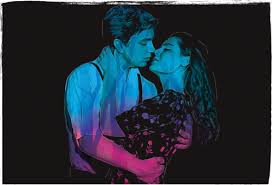by Laura Ferguson
Even with the first song, “Mama Who Bore Me”, I can tell this musical will be abrasive, grating on my skin to make me feel angry and uncomfortable. Misinformation given out to inquisitive children in the form of protecting them; negative views on sexuality, female sexuality in particular, and the palpable shame felt by the characters for their curiosity are meant to set the audience on edge. Here, Spring Awakening succeeds. With eyes narrowed, we look at the parents with distrust just as the kids do and already, the consequences of this repression teeter on the shadowed outskirts of the stage, waiting to engulf Jessica Old’s Wendla by her innocent throat.
The musical mostly focuses on characters Wendla (Jessica Old) and Melchior (Maxwell Apse). The differentiating circumstances of Wendla’s Christian upbringing and Melchior’s atheist, more liberal household environment culminating together in an instant that then has drastic ramifications. Around them, the other children go through various dilemmas: puberty, masturbation and wet dreams, emerging feelings of homosexuality, and abuse suffered at home. These heavy themes are navigated well by the cast and their singing talent is impressive, voices soaring with emotion. A biting anger in ‘The Bitch of Living’ and sighing tenderness is ‘Touch Me’. The ensemble blow me away at times by their talent.
Director Ben Emerson has fused elements of both the original Wedekind play and Sader and Sheik’s musical, leaving out the latter’s consent-giving sex scene for Wedekind’s rape. There are eight separate instances of sexual or physical violence towards women either shown or mentioned and no woman is allowed to feel her pleasure. Even the character Ilse, played wonderfully by Cassandra Tse, who has run away from familial violence to a bohemian art collective to be a muse and model is not given the romanticism of that lifestyle. Instead, we find out one artist kidnapped her and threatened her life with a gun. Tse’s vivacious performance and her glittering care for her old friend Moritz (Konrad Makisi), reaching out to him in a time of need making her situation seem even worse as no one was caring for her this way.
Scene like this with Ilse and Moritz (Konrad Maikisi) are full of purples and dark blues, which lighting designer Jennifer Lal uses to intensify the drama, coalescing well alongside the rock-style music. These darker colours change to reds during the songs that emphasised the anger of the cast, which really helped to guide us through the show when the music drowned out the lyrics, which happened quite often. Although the band consisting of Anna McBride and Tiffany Anderson did a great job with timing and the live aspect made Spring Awakening feel very present, too often did I need to look to the lighting and choreography to interpret the song lyrics. Manuel Solomon’s choreography helped me never feel completely lost. Spiked fists in the air to showcase anger and languid sensuous movements across bodies for desire punctuated the lyrics of the songs. The use of the smoke machine, however, was enthusiastic to the point my friend noted the theatre felt like it was being hotboxed. The overindulgence of the smoke kept pulling me out of the moment as the smell of almonds and stale sweat assaulted me. I was never quite sure why it was being used as the rest of the stage was stark and left much to our imagination.
As Spring Awakening progresses, I found myself forced into the hateful position of being a passive bystander as abuse after abuse traipsed across the stage. Having to watch as Melchior raped Wendla was horrendous when the musical had made it obvious he knew what he was doing and even the subtleties of female pleasure from an essay detailing such intimacies given to his friend Moritz. The music says one thing but the actions of Old and Apse show another. It almost seemed as if the production wanted to capitalise on the #metoo movement for relevance and in doing so, created a schism between Emerson’s directing and Sader’s lyrics.
The second act hurdles the characters into worsening circumstances. The choice to have Wendla has change into a red dress from her earlier dark one visually brands her a sinner when she was the one assaulted. It is now I experience the emotional brutality of Makisi’s Moritz committing suicide. Having failed out of school, Moritz’ depression leading up was subtle and the event itself confusing, I thought it had happened earlier than it did. He climbs up the ladder stand-in for an oak tree and the lights dim to black. But this is not the moment, it happens similarly later on. Unfortunately, this undercut my emotion as I had already felt what I was supposed to feel. Instead, Moritz’ suicide is used as a device to get Melchior in enough trouble to send him to a reformatory, with the combination of the discovery of the essay on sexuality as apparent cause for Moritz’ death and the rape of Wendla. It feels tacky and gross to use suicide as a vehicle this way.
‘The Song of Purple Summer’ is belted out by the cast to round off Spring Awakening. It is a song about how the repressive behaviours of the parents and teachers will eventually give way to the more liberal-mindedness of the children. However, as this charge is helmed by Melchior, I want nothing to do with a future where that rapist is leading the way.
Spring Awakening is ultimately about sex, death and rock’n’roll. The usual sparkling glamour of those words stripped from their purpose: Sex. Death. Rock’n’roll. Spring Awakening. Here, they are dark words, tombstone words. Aand I feel dark along with them. Here, the authority figures of teachers and parents are despicable and untrustworthy. Here, the children are innocent and anguished and here those that know better do not do better. This may be Spring Awakening, but I think I need to sleep it off.






